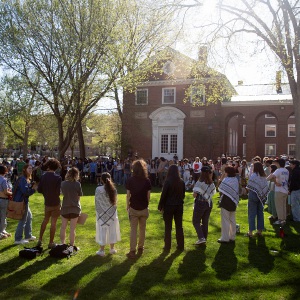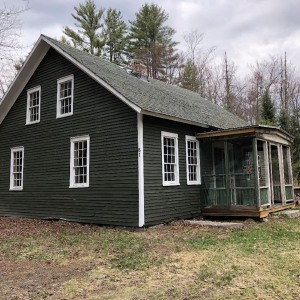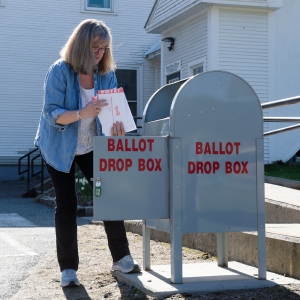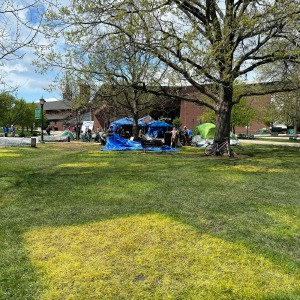Nonprofits’ property tax-exempt status threatened by paperwork issues
| Published: 10-23-2023 10:23 PM |
CANAAN — Earlier this month, the Canaan Selectboard voted to rescind property tax-exempt status for six nonprofit organizations.
The decision comes as the state is paying closer attention to which nonprofit organizations are receiving tax exemptions and whether organizations file required paperwork before a statewide deadline.
Four of the organizations in Canaan — including the American Legion, Cardigan Mountain Fish and Game Club, West Canaan Methodist Church and the West Canaan 4-H group — were denied, in part, because they failed to file the proper paperwork by an annual April 15 deadline, as mandated by state law. Two others, Old North Church and New England Forestry Society, had their statuses rescinded due to how their properties are being used.
While the organizations will be issued tax bills this December, there is still an opportunity to appeal to the Selectboard for an abatement to avoid paying.
“Every year, they have to file on time and the correct paperwork,” Selectboard Chairman Stephen Freese said in a phone interview earlier this month. “They had not necessarily been forced to do that in the past.”
Freese said that it is up to the nonprofit organizations and their boards to make sure they have the paperwork they need and that it is filed before the deadline. Canaan sent out notices to nonprofit organizations prior to the deadline, reminding them of the property tax exemption paperwork deadline, though the town is not required by law to do so. The towns decide who qualifies, though the state is scheduled to conduct an audit of each municipality in five-year cycles. The paperwork is created by the state, but must be filed with the town.
“We can’t consider them a non-taxing entity unless they’re following the state rules,” Freese said of the nonprofits. “The state makes those rules, not us.”
Robin Dow Parker, a member of the American Legion who oversees its bookkeeping, said she has been in touch with town officials about the paperwork and now has everything in order.
Article continues after...
Yesterday's Most Read Articles
 Dartmouth administration faces fierce criticism over protest arrests
Dartmouth administration faces fierce criticism over protest arrests
 Hanover house added to New Hampshire Register of Historic Places
Hanover house added to New Hampshire Register of Historic Places
 Sharon voters turn back proposal to renovate school
Sharon voters turn back proposal to renovate school
“It was more than I initially realized,” Dow Parker said in a phone interview last week about the filing that was required.
Previously, the Legion post had not known that additional paperwork including its bylaws was required for the tax exemption.
The American Legion will file an abatement request once it receives a tax bill. Knowing what she knows now, Dow Parker said she will be sure to file all the correct paperwork by the April 15 deadline so that the organization does not encounter the same complications next year.
“We’re in good shape,” Dow Parker said. She added that she does not fault town officials for making the decision that they did, because they are just following the law. “I think it’s hard because you get the pressure put on the town, and the town has to press on and get that organized.”
Canaan is not alone in scrutinizing filings for tax exemptions.
Norm Bernaiche, a longtime New Hampshire assessor who currently serves as the town assessor in Hanover and is the Coos and Grafton counties’ regional director for the New Hampshire Association of Assessing Officials, said that a lot of confusion exists about which organizations can qualify for property tax exemption in the state.
“Just because you’re a 501c3 doesn’t mean you’re entitled to a property tax exemption,” Bernaiche said, referring to the Internal Revenue Service designation that exempts nonprofit organizations from federal taxes.
Under New Hampshire law, the federal government, the state of New Hampshire, county government and municipalities do not have to pay property taxes on buildings that they own. Additionally, houses of worship such as churches, educational institutions and veterans organizations are also exempt from property taxes, as long as the properties are being used for those purposes. Those are pretty clear cut, Bernaiche said.
The “charitable” organization exemption is where there is often the most confusion.
“The problem is if then you exempt someone in a feel-good fashion there’s going to be another one that’s come along and you’ve set up a precedent,” Bernaiche said. “You have to be careful with the precedent setting of either the denial or the approval of organizations.”
As a result, Hanover has been scrutinizing the nonprofit organizations it grants the property exemptions to. This year, the town denied the exemption for the Friends of Hanover Crew because Bernaiche said its bylaws and articles of incorporation contained no clear stated charitable purpose.
“They’ve been getting the exemption for years,” he said. Even though the group was denied this year, they can appeal the decision to the Selectboard.
In the last few years, town auditors have been paying extra attention to tax exemptions for nonprofit organizations in light of two recent decisions with statewide implications — one legal and the other regulatory.
In 2021, the New Hampshire Supreme Court ruled in favor of the town of Newport, which denied a tax exemption to New London Hospital in 2016 because the hospital did not file its paperwork by the deadline.
Additionally, in 2022, the state’s Board of Tax and Land Appeals ruled in favor of Ossipee taxpayers who filed a complaint alleging that the town erred in granting a tax exemption to a Masonic Lodge. They argued the lodge did not meet the qualifications for charitable organizations under state law, which “requires an applicant be required to provide some charitable service and be obligated by its charter to provide this service to a substantial and indefinite segment of the general public that includes residents of NH with no financial profit or benefit to its officers or members, or those of any related organization,” according to a description from the New Hampshire Department of Revenue Administration.
The state Department of Revenue Administration confirms that the paperwork nonprofit organizations file with the town for tax exemptions is in order, but it does not “provide directives to assessing officials about whether to qualify a given applicant,” Adam Denoncour, assistant director of the Municipal and Property Division in the Department of Revenue Administration, wrote in an email.
In 2023, the Assessing Standards Board also revised its standards on how nonprofit tax exemptions are dealt with: At least once every five years, the state oversees an assessment review in each municipality.
“Previously, the ASB standards only related to compliance for a single tax year, while the new ASB standards require municipalities to provide proof that each organization receiving the exemption properly filed their application and related documents for each year since their last assessment review,” Denoncour said.
In Hanover, officials have made more of an effort to make sure that the nonprofit organizations are compliant with the state’s deadlines and have all the necessary paperwork.
“We even had to tidy that up a bit in Hanover in terms of making sure we had all the articles of incorporation and the bylaws, so we’ve done that,” Bernaiche said.
The Department of Revenue Administration, of which the ASB is part, also has developed a new training program to better inform town officials about tax exemptions.
“This training was conducted by department staff twice in the past year to meet the growing need for additional knowledge and guidance on these topics,” Denoncour said. “We plan to continue to develop this presentation and provide it to folks as the legal landscape on these issues continues to shift.”
Liz Sauchelli can be reached at esauchelli@vnews.com or 603-727-3221.

 Students take down pro-Palestinian encampment at UVM
Students take down pro-Palestinian encampment at UVM
